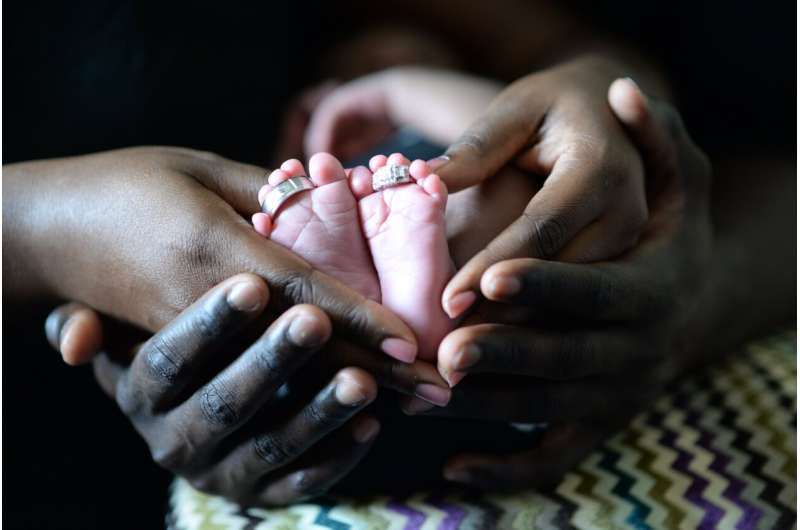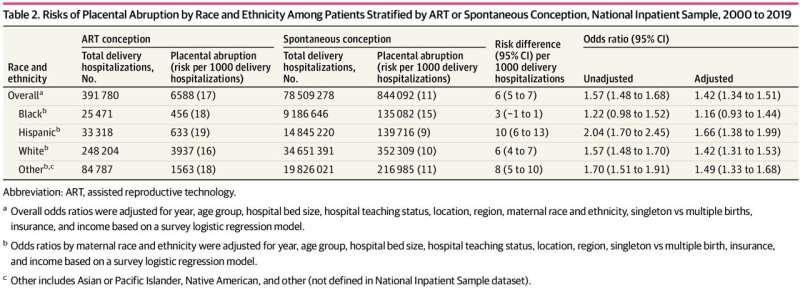This article has been reviewed according to Science X's editorial process and policies. Editors have highlighted the following attributes while ensuring the content's credibility:
fact-checked
peer-reviewed publication
trusted source
proofread
Study reveals doubled risk of preterm birth for IVF pregnancies complicated by placental abruption

Women who conceive through in vitro fertilization and experience a serious pregnancy complication are twice as likely to deliver early (<37 weeks) compared to those with only one of those factors, according to a Rutgers Health researcher.
The study, which appeared in JAMA Network Open, analyzed nearly 79 million hospital deliveries in the United States over two decades. It is the first to examine the combined effects of assisted reproductive technology, such as in vitro fertilization, and placental abruption on preterm delivery rates. (The term is abbreviated as ART in medical circles.)
"It's crucial for patients undergoing IVF to be aware of all potential outcomes, especially given the stress they're already under," said Jennifer Zhang, the study's lead author and an obstetrics and gynecology resident at Rutgers Robert Wood Johnson Medical School.
The study utilized the National Inpatient Sample, one of the largest inpatient databases in the U.S., encompassing hospital data from 48 states. Using data from 2000 to 2019, researchers identified more than 391,000 pregnancies that underwent assisted reproduction and more than 850,000 cases of placental abruption, a known risk factor whereby the placenta separates from the uterus before delivery.
Researchers involved in the study found that women who conceived through ART had a 42% higher risk of experiencing abruption compared with those who conceived naturally. They also found that women who conceived through ART had a 46% higher chance of experiencing preterm birth than those who conceived naturally.
When both risk factors were present, a synergistic effect occurred.
Researchers also reported racial and ethnic differences. White women who conceived through ART had a 42% higher risk of placental abruption, right around the overall average. Hispanic women who conceived through ART faced an even higher elevation in risk, 66%. In contrast, Black women who conceived through ART faced no elevation in abruption risk over Black women who conceived naturally.

These findings could have significant implications for clinical practice, though Zhang cautioned against immediate changes based on a single study.
"We need prospective studies to confirm these results," said Cande Ananth, chief of the Division of Epidemiology and Biostatistics in the Department of Obstetrics, Gynecology, and Reproductive Sciences at Rutgers Robert Wood Johnson Medical School and senior author of the study. "But it might influence how clinicians approach certain situations, particularly since it would be tough to examine this particular relationship through a prospective study."
For instance, doctors might be more inclined to take aggressive action when an IVF patient shows signs of placental abruption. Whether the type of infertility treatment and the duration of treatment affect placental abruption and preterm delivery may be worthy of consideration.
The research comes at a time when ART use is on the rise. According to the Centers for Disease Control and Prevention, about 2% of all U.S. infants are conceived using these technologies, up from less than 0.5% in 2000. As the use of ART has grown, so have concerns about its potential complications.
"ART pregnancies are already associated with increased risks of conditions such as preeclampsia and small for gestational age births," said Zhang, adding that this study sheds new light on another complication.
However, the study has limitations. As a retrospective analysis of hospital data, it couldn't account for all potential confounding factors or distinguish between different types of ART. The researchers also noted their dataset likely underestimates the total number of ART pregnancies, as it relies on hospital coding practices, which may not always capture this information accurately.
Despite these caveats, the findings underscore the need for careful monitoring of ART pregnancies, particularly when complications arise, the researchers said. They also highlight the complex interplay between fertility treatments and pregnancy outcomes.
Looking forward, the researchers are turning their attention to other potential complications of ART pregnancies.
"We're examining the association between ART and stillbirth," Zhang said.
More information: Zhang, J. T. et al. Risks of Placental Abruption and Preterm Delivery in Patients Undergoing Assisted Reproduction, JAMA Network Open (2024). DOI: 10.1001/jamanetworkopen.2024.20970




















